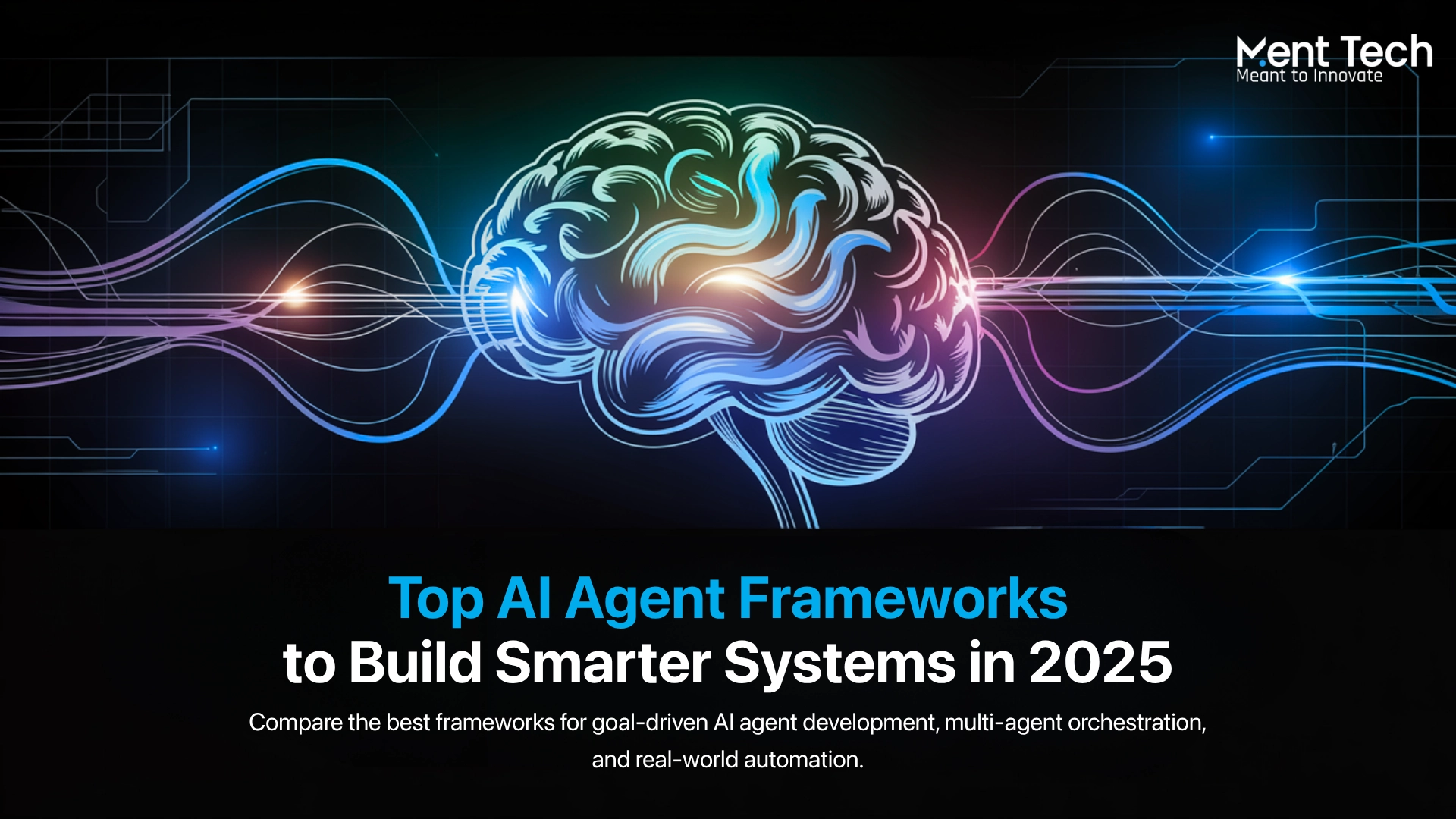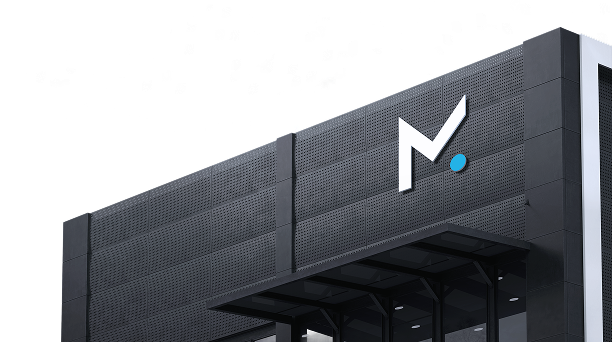In the early days of automation, businesses relied on rule-based bots and process automation to boost efficiency. Over time, virtual assistants and chatbots added conversational layers to these systems. But today, we’ve entered a new era where intelligent AI agents are taking the lead in systems that can think, plan, and act independently toward specific goals.
According to the PagerDuty 2025 AI Agents Report, over 50% of enterprises expect AI agents to automate between 26% and 50% of workloads by 2025, showing how quickly this technology is becoming mission-critical.
As organizations prioritize speed, personalization, and autonomy, AI agent frameworks in 2025 have become the backbone for building scalable, goal-driven systems. These frameworks combine LLMs, memory modules, tool integration, and orchestration capabilities into one structured environment, making AI agent development more powerful and accessible than ever.
Whether it’s automating financial analysis, managing enterprise data, or delivering hyper-personalized user experiences, AI agents are redefining how businesses operate at scale.
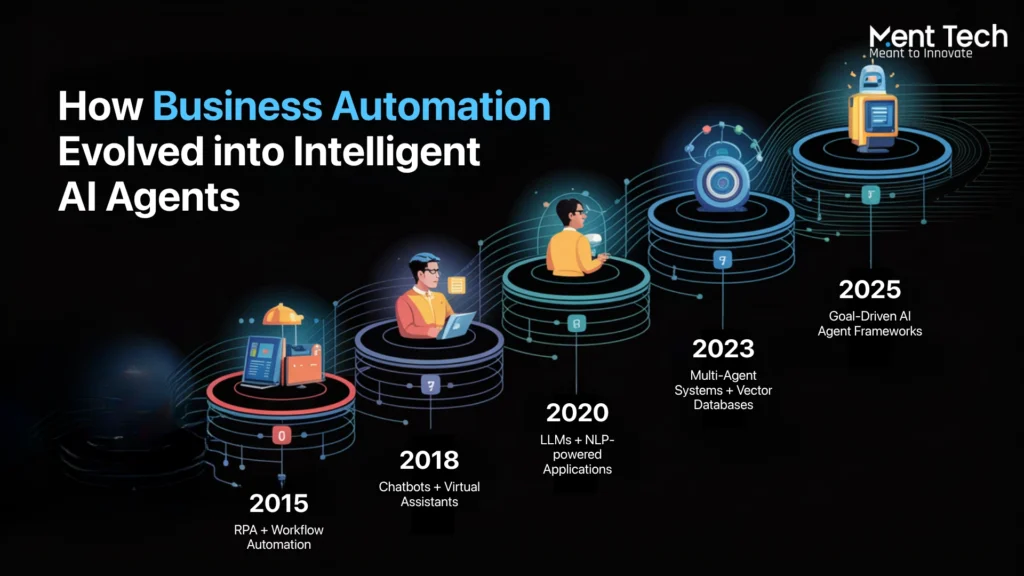
What Are AI Agent Frameworks, and Why Do They Matter?
AI agent frameworks are platforms that help build intelligent systems capable of planning, decision-making, and interacting with users or other tools to achieve specific goals, without starting from scratch.
They provide a structured environment where agents can learn, adapt, and collaborate efficiently. This makes it faster and easier for businesses to develop AI-powered applications that are flexible and scalable.
Why AI Agent Frameworks Are Important
- Simplifying agent creation with pre-built modules
- Enabling planning, memory, and tool integration
- Supporting scalability to handle multiple tasks simultaneously
- Improving adaptability across industries like finance, retail, logistics, and customer support
Businesses increasingly rely on AI development services that leverage these frameworks to save time, reduce costs, and build smarter automation tools that deliver better outcomes.
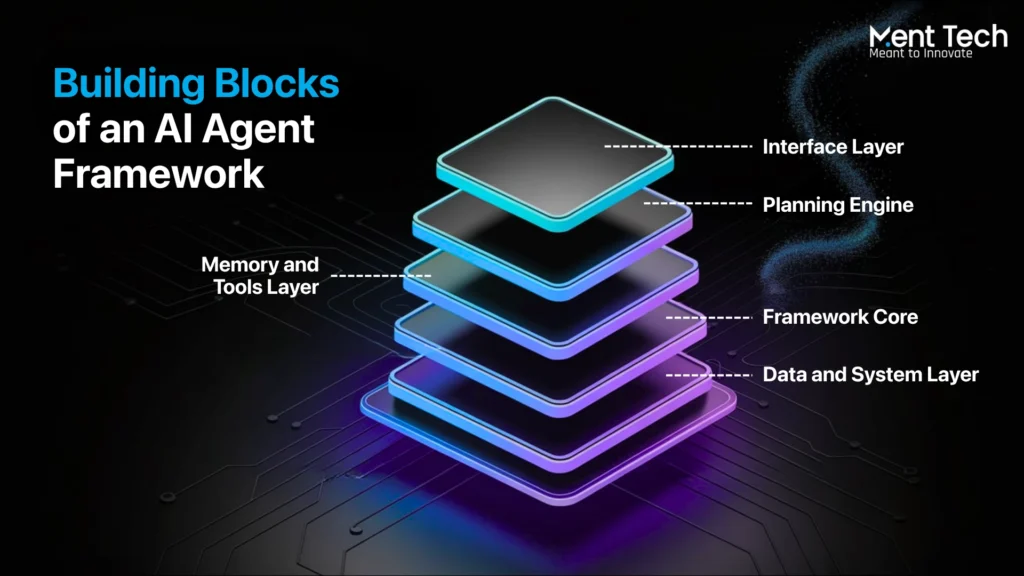
Key Features to Look For in an AI Agent Framework
Choosing the right AI agent framework is essential to building scalable, efficient systems that deliver real business impact. When exploring popular AI agent frameworks, keep an eye on these key features:
1. Modular Architecture & Extensibility
A modular design offers reusable building blocks, letting teams quickly update or expand systems without rebuilding from scratch. Frameworks that support easy integration with APIs and external tools empower businesses to automate complex workflows efficiently using AI development services.
2. Multi-Agent Collaboration
Complex problems often require multiple agents working together. Look for frameworks that enable multi-agent systems in AI, allowing agents to communicate, coordinate, and share information for faster, smarter decision-making.
3. Contextual Memory & Adaptability
Agents that remember past interactions provide more personalized and accurate responses over time. Strong memory modules help AI agents learn and improve, which is critical for customer support, personalization, and Adaptive AI Solutions.
4. Real-Time Performance & Scalability
Fast, low-latency response is a must for live environments like customer service or AI trading platforms. Choose frameworks built to scale seamlessly across teams and geographies without sacrificing performance.
5. Support for Large Language Models (LLMs)
Frameworks that integrate with advanced LLMs (such as GPT-4) enhance natural language understanding and reasoning, enabling agents to interact more fluidly and intelligently with users.
6. Security & Compliance
Robust security features like role-based access control and data compliance modules ensure that your AI agents protect sensitive information and operate within regulatory guidelines, a necessity for enterprise-grade deployments.
By focusing on these features, organizations can leverage AI as a Service companies services to build adaptive, secure, and efficient systems that transform business operations.
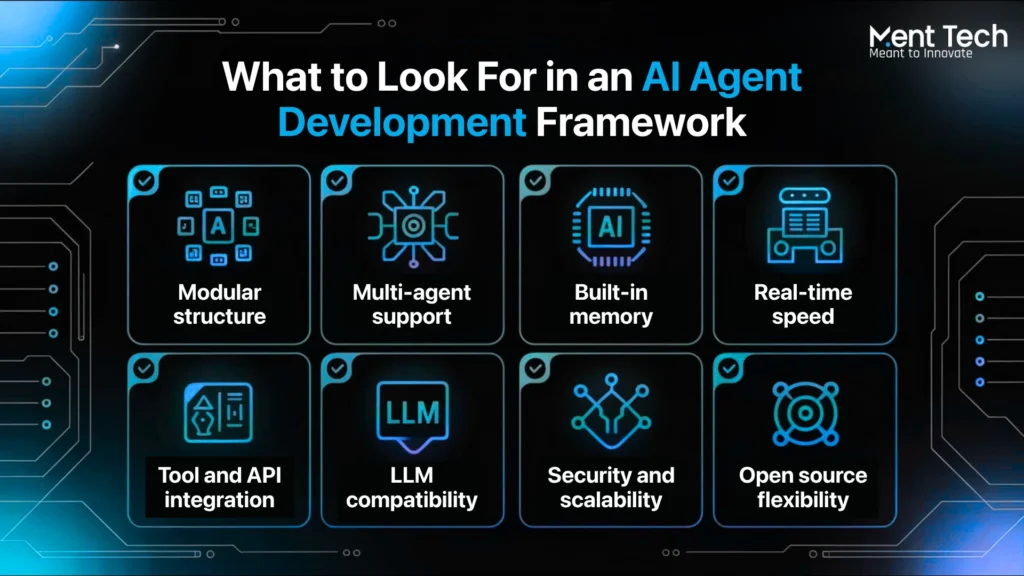
Top AI Agent Frameworks to Watch in 2025
The demand for intelligent, self-operating software is pushing the growth of powerful AI agent frameworks. These frameworks give developers and businesses the tools to create agents that can think, decide, and act on their own.
Here are the best AI agent frameworks to explore in 2025. Each one brings a unique set of features to support everything from quick experiments to full-scale enterprise AI agent development.
1. AutoGen
AutoGen is an open-source AI agent framework designed to simplify collaboration between multiple agents. It works well for research-heavy tasks and complex problem-solving, making it ideal for technical teams.
Why use it:
- Handles multi-agent orchestration
- Supports Python and .NET agents
- Offers built-in tracing and observability
Best for: Teams focused on research or dynamic workflows.
2. CrewAI
Why use it:
CrewAI is a fast, lightweight Python framework built for performance and simplicity. It avoids dependencies on other libraries like LangChain and gives developers full control over how agents behave.
- Role-based agents with clear responsibilities
- Custom tools and API support
- Lightweight and high-speed execution
Best for: Developers seeking complete flexibility with minimal overhead.
3. LangChain
LangChain is one of the most popular AI agent development frameworks available today. It offers a modular system for building LLM-powered agents, complete with memory, tool use, and workflow design.
Why use it:
- Wide LLM support including OpenAI and Cohere
- Easy chaining of logic steps
- Strong community and plugin ecosystem
Best for: Teams looking for quick setup and large language model compatibility.
4. LangGraph
LangGraph is built by the team behind LangChain and brings a visual, graph-based approach to agent design. It is built for advanced workflows where logic, state, and memory must be managed clearly.
Why use it:
- Visual logic flow with conditional steps
- Integration with LangChain tools
- Built for multi-step reasoning
Best for: Enterprises that want clear visibility and control.
5. LlamaIndex
LlamaIndex is focused on Retrieval-Augmented Generation (RAG) and context-aware AI systems. It excels at data indexing, context creation, and working with multi-agent setups.
Why use it:
- Works with various LLMs and vector stores
- Flexible querying with context injection
- Python and TypeScript support
Best for: Teams building AI agents that need strong search and data processing.
6. Semantic Kernel
Backed by Microsoft, Semantic Kernel is a smart, enterprise-ready SDK for AI agent development. It helps you blend symbolic AI, LLMs, and business rules into modular, reusable agents.
Why use it:
- Multi-language SDKs (Python, Java, C#)
- Strong security and privacy tools
- Excellent enterprise-grade observability
Best for: Large teams needing secure, customizable, and compliant solutions.
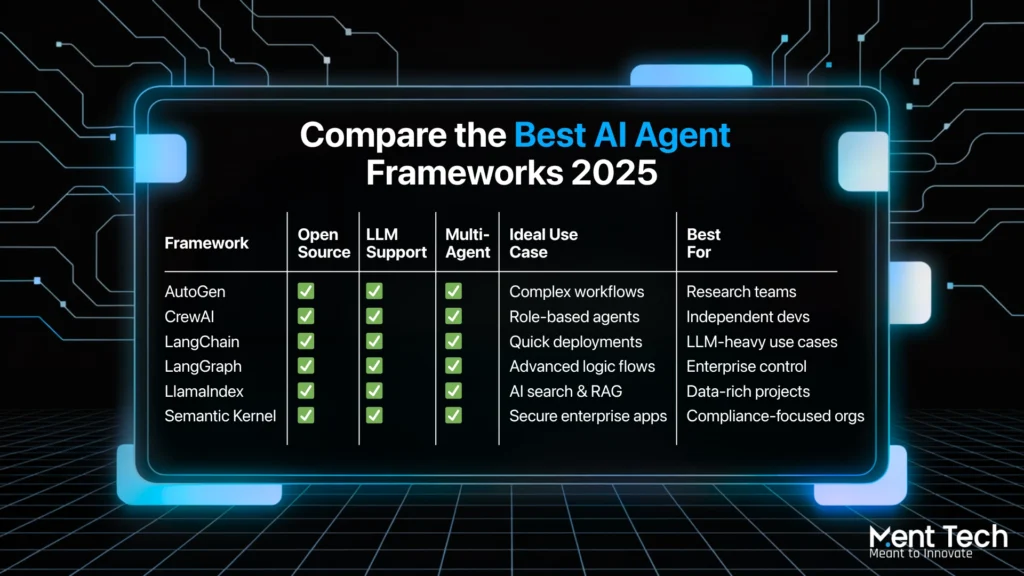
How to Choose the Right AI Agent Framework for Your Business?
With many powerful frameworks available, selecting the right one depends on your specific use case, technical skills, infrastructure, and long-term automation goals.
According to McKinsey’s 2023 report, 66% of early AI adopters have seen revenue increases and cost reductions from AI implementations, highlighting the value of choosing the right framework.
Here are five practical factors to guide your decision:
1. Define Your Use Case
Are you building a customer support assistant, an internal automation tool, or a multi-agent research system? Clear goals will guide the selection of your AI agent framework.
2. Evaluate Technical Skills
Some frameworks require advanced coding and system design knowledge. Others are more beginner-friendly. Make sure the framework fits your development team’s strengths or the capabilities of your AI agent development company.
3. Consider Integration and Infrastructure
Look for frameworks that can connect with your existing APIs, cloud environments, and databases. A flexible AI agent development framework should support both current systems and future expansion.
4. Focus on Security and Compliance
Privacy regulations are tightening. Choose frameworks that offer built-in compliance tools, secure memory modules, and access control features.
5. Prioritize Scalability
The framework should handle increasing user traffic and expanding task volumes without performance loss. This is where working with experienced AI agent development services providers makes a real difference.
By carefully evaluating these factors, businesses can confidently select AI agent frameworks that align with their strategic objectives and operational needs.

Why Custom AI Agent Development Still Matters?
While pre-built frameworks offer a quick way to experiment, businesses with complex needs often reach a point where customization becomes essential. Generic setups may suffice for testing ideas, but usually fall short when it comes to performance, flexibility, or compliance.
Industry leaders like OpenAI and Retool highlight that many companies prefer leveraging agent frameworks instead of building foundational models from scratch due to cost and ROI considerations. However, custom AI agent development remains crucial when unique workflows, strict compliance, or specialized integrations are required.
Choosing between custom development and framework-based solutions depends on your specific goals, resources, and risk tolerance. For many enterprises, partnering with AI startups skilled in tailored agent solutions offers the best path to scalable, effective AI adoption.
Benefits of Custom AI Agent Frameworks
1. Tailored Logic and Workflows: Off-the-shelf tools follow fixed structures. Custom frameworks give your team full control over task logic, memory handling, and multi-agent behavior.
2. Flexible Integration with Internal Systems: When your agents need to work with enterprise APIs, private data lakes, or real-time dashboards, customization becomes key. A strong AI agent development framework should fit into your ecosystem, not force you to rebuild it.
3. Enhanced Security and Compliance: Businesses in finance, healthcare, and legal sectors must meet strict regulatory requirements. Custom AI agent development services let you embed policies like role-based access, data encryption, and audit trails directly into your agents.
4. Ownership and Innovation: Custom-built agents give you complete IP control. You can fine-tune, extend, or repurpose them for new use cases. This long-term ownership is critical for companies building product lines or automation platforms.
Ment Tech Labs Builds What Off-the-Shelf Tools Can’t
At Ment Tech Labs, we specialize in creating advanced, production-grade AI agent development frameworks that match your business goals.
Our approach includes:
- Designing custom agent logic based on your use case
- Connecting to internal databases, CRMs, and tools
- Supporting secure multi-agent collaboration
- Enabling on-prem, cloud, or hybrid deployment
- Integrating LLMs, memory systems, and decision layers
- Offering continuous updates and support as your needs evolve
From strategy to launch, we ensure your AI agent development journey is fast, flexible, and future-proof.
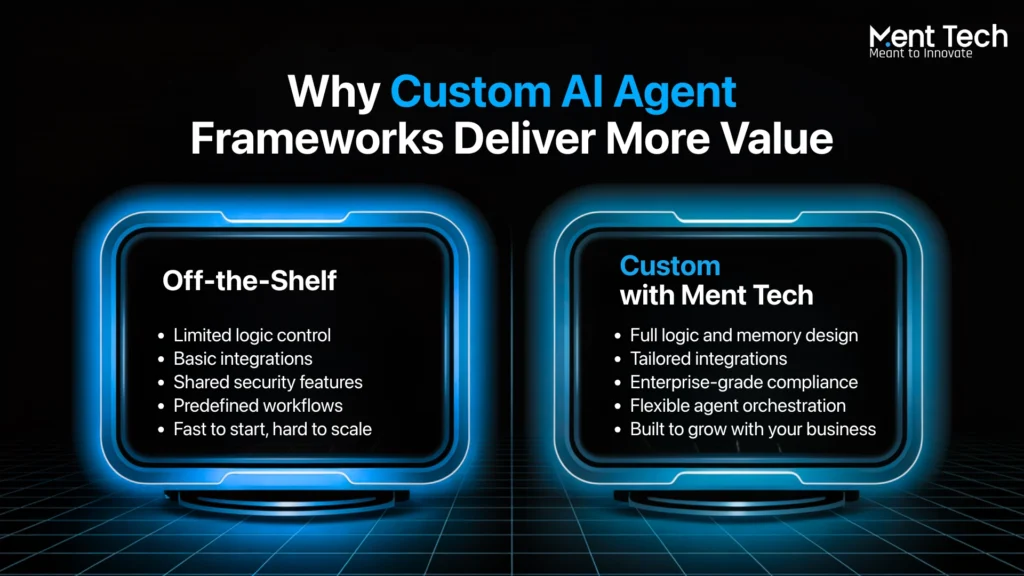
Conclusion
AI agent frameworks have evolved from experimental tools to essential elements of enterprise automation. From customer service bots to complex multi-agent systems, they enable businesses to build intelligent, goal-driven agents at scale.
In 2025, choosing the right framework featuring modular design, LLM compatibility, and seamless integration is just the beginning. The true value lies in customizing solutions to fit your unique needs, something Ment Tech Labs excels at as a trusted AI agent development company, delivering flexible, industry-ready solutions custom for real-world performance.
We provide secure infrastructure and dedicated support to deliver reliable, adaptive agents that empower smarter, real-time decisions, enhancing human potential, not replacing it. Reach out to us today to get started.
FAQ
1. What are AI agent frameworks and how do they work?
AI agent frameworks are software platforms that help developers build intelligent systems that can plan tasks, make decisions, and interact with other tools or users. These frameworks manage the logic, memory, workflows, and integration layers needed to run AI agents effectively.
2. Which is the best AI agent framework to use in 2025?
The best AI agent framework in 2025 depends on your business needs. CrewAI is great for lightweight projects, LangGraph works well for complex workflows, and Semantic Kernel offers enterprise-grade features. Each framework supports modular AI agent development and seamless LLM integration.
3. Can AI agent development frameworks support multi-agent systems?
Yes, most modern AI agent frameworks in 2025 support multi-agent systems. Frameworks like AutoGen, LangChain, and LangGraph allow multiple agents to collaborate, share tools, and complete tasks in parallel using shared logic or communication protocols.
4. Are there open source AI agent frameworks available for developers?
Yes, there are several open source AI agent frameworks such as LangChain, CrewAI, and AutoGen. These platforms are freely available, customizable, and supported by active developer communities. They are ideal for both experimentation and production use.
5. How do I choose the right AI agent development framework?
To choose the right AI agent development framework, consider your project’s complexity, required integrations, team skill set, and future scalability. Businesses often work with AI agent development service providers like Ment Tech Labs to build custom frameworks aligned with their operations.
6. Why should businesses invest in custom AI agent development?
Custom AI agent development allows businesses to create systems that match specific goals, workflows, and compliance needs. Unlike off-the-shelf tools, custom frameworks offer full control, better performance, and long-term flexibility.
